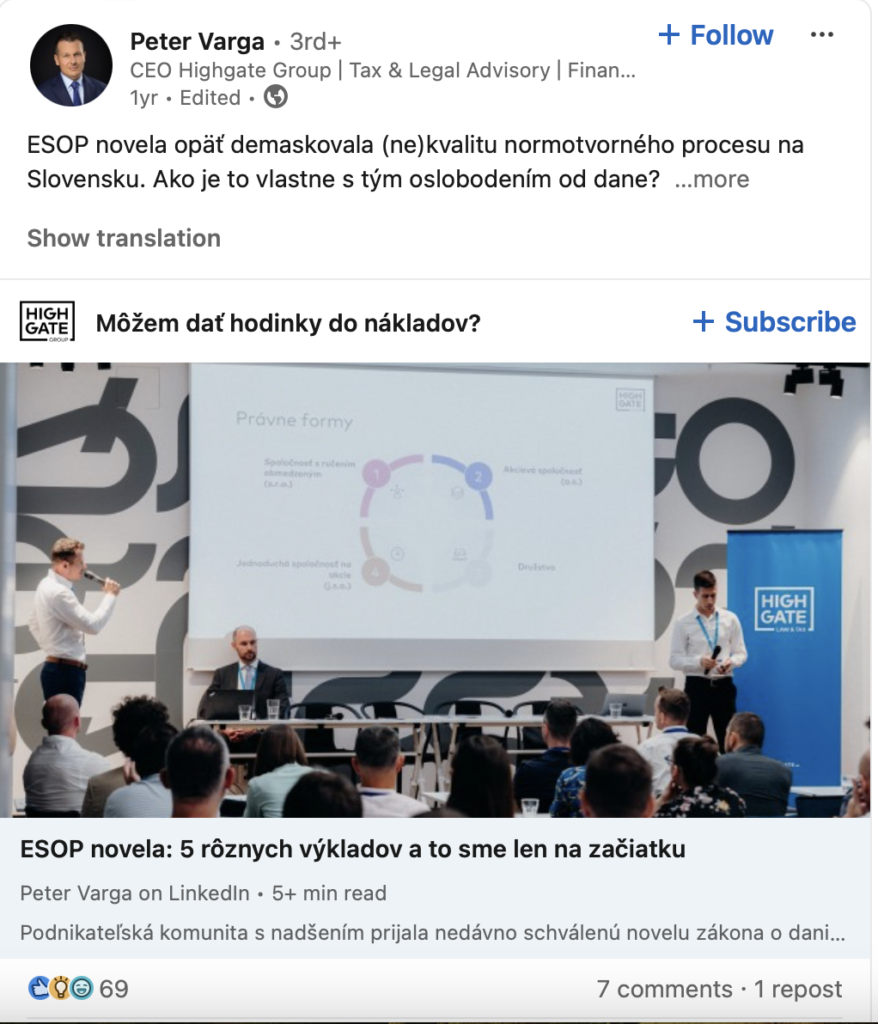

The ESOP amendment once again exposed the (in)quality of the standard-setting process in Slovakia. How is it actually with the tax exemption? The business community has enthusiastically embraced the recently approved amendment to the Income Tax Act (the “ESOP amendment”), which aims to exempt/non-tax acquired shares in companies for so-called ESOPists. Unfortunately, there is a relatively clear disconnect between the ambition of the ESOP Amendment and the ability of its language to produce a general consensus on its content. My colleague Vladimíra Mačuhová and I counted 5 completely different interpretations of the ESOP amendment. For example: ➡️ The acquisition of shares under an ESOP is never taxed;
➡️ The acquisition of shares under an ESOP is also taxed retroactively 10 years after the company pays the dividends. While it is true that a legal text (i.e., an ESOP amendment) must enjoy a certain degree of linguistic openness due to its adoption in advance for an indeterminate number of cases, the ESOP amendment exhibits the basal signs of semantic and, in part, linguistic chaos.
In addition to the interpretative problems, the ESOP amendment has several other shortcomings:
➡️ pays no attention to SRO contractors;
➡️ pays no attention to real shares, the quality of which is legally limited (bad leaver clauses, transferability, …);
➡️ does not allow the acquisition of shares in, for example, a cooperative;
➡️ has limited application to absolutely standard ESOP structures where, for example, shares are not acquired directly on TARGET;
➡️ may not even capture situations where the ESOPist acquires the interest in the corporation from the shareholder and not from TARGET; and the fact that the ESOP Amendment, along with the Crypto Amendment, taxes the sale of ESOP shares in an SRO but, for reasons between heaven and earth, does not tax the sale of ESOP shares is probably not even worth addressing anymore. Regardless. Thus, we are still forced to find/add alternative legal structures and setups for clients such as ESOP intra legem not taxed. And worse, in practice, the alternatives are even situations where companies give no imperative weight to the taxation of ESOPs. In either case, it is the business environment that suffers in the long run. Namely, through unnecessarily higher costs to advisors (us) and/or the existence of an unfair, arbitrary and non-transparent environment. Whoever would be more interested in the topic (especially attorneys and tax advisors), I write more about it in technical terms (including an analysis of those different interpretations) in a subsequent blog. So we can only hope that the new government will bring balance, standardisation, reform and quality to the legislative process 🙂
Law & Tax
Tomas Demo
tomas.demo@highgate.sk
Accounting
Peter Šopinec
peter.sopinec@highgate.sk
Crypto
Peter Varga
peter.varga@highgate.sk